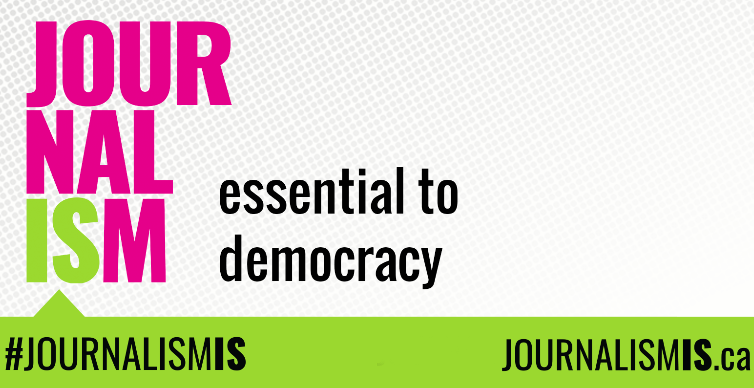Until September, readers of the Globe and Mail, Toronto Star, Postmedia and more may notice ads telling them about how the reporting they’re consuming is made—and why it’s important.
[[{“fid”:”4491″,”view_mode”:”default”,”fields”:{“format”:”default”,”field_file_image_alt_text[und][0][value]”:””,”field_file_image_title_text[und][0][value]”:””},”type”:”media”,”link_text”:null,”attributes”:{“height”:”388″,”width”:”754″,”style”:”width: 400px; height: 206px; margin-left: 10px; margin-right: 10px; float: right;”,”class”:”media-element file-default”}}]]By Chantal Braganza, Associate Editor
Until September, readers of the Globe and Mail, Toronto Star, Postmedia papers and more may notice advertisements telling them about how the very products they’re consuming in print, online or by broadcast are made—and why they’re important. Spearheaded by trade union Unifor and supported by more than a dozen media and journalism school sponsors, the recently launched JournalismIS campaign aims, says its mandate, to foster a public discussion that celebrates, discusses and critiques the work of professional journalists.
“I think journalists have always been unwilling to do the navel gazing that’s common and expected in other professions,” said Winnipeg Free Press public policy reporter and JournalismIS representative Mary Agnes Welch. “We don’t want to be the story. We don’t get viewers to know or care about how we got the story or what might be involved.
“And maybe we just assume that people saw All The President’s Men, that they understand what we do. And the longer I’ve been a journalist, the more I realize that people really don’t.”
Outside the industry sphere itself, the past year has been rife with public discussions of the work Canadian journalists do—in many cases, conflict-of-interest scandals, from the resignation of Leslie Roberts from Global News in January to the firing of CBC’s Evan Solomon earlier this month.
Welch said that such cases are outliers. “Most journalists would never think of behaving in that way—but we never say this. But we let those big cases form the way we think about how journalists behave.”
“It’s not why we began this campaign,” she said. “But there’s a sense that there’s already this Canadian discussion underway. We haven’t been great about wading into it.”
Last summer, Unifor’s national media sector allotted about $80,000 for a project that at the time was envisioned as both a campaign and the launch of a coalition that would continue to organize events and projects around the theme of promoting and discussing professional journalism.
The ad campaign itself was developed over the past year and launched on June 12 at Ryerson University in Toronto. Media sponsors such as the Globe and the Star offered pro-bono space for the ads. Depending on whether funding continues, Welch said, other projects down the road could include media literacy projects for schools or an investigative journalism fund.
The series of print, radio and broadcast ads that comprise the campaign highlight 10 journalistic principles that JournalismIs organizers pulled together from established guidelines from organizations such as the Canadian Association of Journalists, where Welch was a past president, Poynter and the Pew Research Center. Some feature profiles of prominent Canadian journalists, such as Andrew Coyne and Ingrid Peritz, and elaborate on values from “creating a forum for public debate” to “giving a voice to the voiceless.”
“There’s a pretty significant consensus on what the core principles of good journalism are—but we also needed to make them punchy for ads. We also made it clear that this is a start; if there’s something you want to add, tell us.
“We want Canadians to answer that question; we’ve given you 10 of our answers. Now what are yours?”

